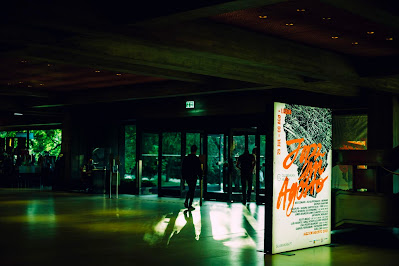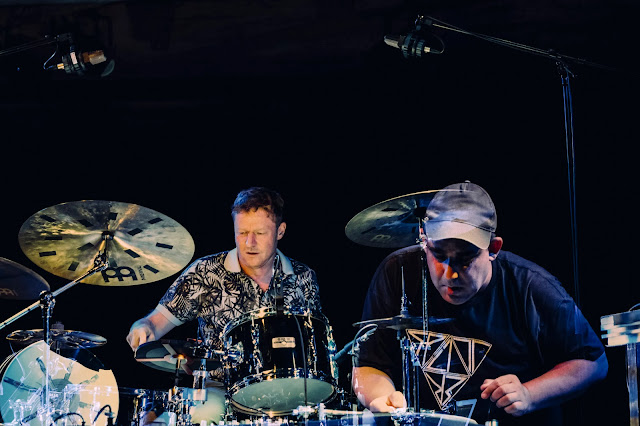 |
| Photos by Vera Marmelo – Gulbenkian Música |
By Paul Acquaro
How do you know on what sound you’re dropping the needle?
I’ve never understood this, being a long time LP enthusiast, but by no means a DJ, I shakily aim the stylus for the blank area before the starting groove, placing it anywhere else is simply random. So when the Berlin based electronic musician Ignaz Schick deftly switched out one record for another and seemingly knew where he was going with the needle, I drew a comparison to the practiced intonation of an upright bassist or violinist, it’s a combination of muscle memory and a lot of practice.
ILOG2: Ignaz Schick & Oliver Steidle
 |
| Oliver Steidle and Ignaz Schick. Photos by Vera Marmelo – Gulbenkian Música |
Schick is a body in motion on the stage, behind an elaborate rig of electronics, at least one turntable, mixers, and possibly a laptop? I cannot see it all, but there is a lot of stuff. Stage right sits drummer Oliver Steidle, behind a regular drum kit that he’s morphing into something entirely different through hard, precise beats and uncountable (at least to me!) time signatures. He is seeing and feeling patterns and pulses in ways that are as jarring as they are intriguing.
Schick is conducting a quartet of R2D2s (sorry, this is as evolved as my language around electronic music is at the moment). With complete mastery over the seemingly endless array of sounds from his rig, these are not random sounds, rather a composition in snippets and dabs of sonic color. There a method to these manipulations and Steidle is reflecting them, just as much as his playing is influencing Schick’s next move.
Through their rhythmic deconstructions, they build something unique. Not an obvious musical structure, this is not four-on-the-floor techno, it is much more frenetic and gripping, even during a ‘calm’ moment of 11/8-on-the-floor. They are building things anew from fractalized bits of beats and sound.
However, I find I could also use a bit of a digestif – the brain tries to find patterns in this deliberate chaos, listening for parts, trying to making ‘sense’, and it can get a bit tired. The musicians know this, hell, they’re professionals, both based in Berlin, Steidle is an in demand jazz drummer and Schick is a saxophonist in addition to his work with electronics, and so they know to lower the temperature and simplify the output just before too many heads overheat. This is also where it gets really interesting: the sonic range tightens as both musicians hone in on a particular vibration. A kid, maybe 10 years old, across the aisle is dancing in her seat, so is some young dude a couple rows up. They are bopping to that subconscious something that the duo has tapped into.
One complaint? I could have done without the ear piercing frequencies that crept up in the later part of the set, otherwise, it was an fascinating experience. It also speaks volumes about the vision of Jazz em Agosto’s musical curator Rui Neves. I’ve spoken to Neves before about his role, documented here, but it is becoming clearer how important it is that he takes such chances on groups like ILOG2, who are are a far cry from traditional jazz and even from free-jazz.
Ikizukuri + Susana Santos Silva
 |
| Ikizukuri + Susana Santos Silva. Photos by Vera Marmelo – Gulbenkian Música |
What a name, Ikizukuri, a Japanese word for the practice of preparing sushi from living seafood. In the grand auditorium of the Gulbenkian Foundation’s large concert hall, were we the diners or the ones being prepared? From the opening onslaught of the music, it was not quite clear!
Surviving the opening moments of drums and bass, what was clear was that Ikizukuri (Julius Gabriel on soprano sax, Gonçalo Almeida on bass, and Gustavo Costa on drums) with trumpeter Susana Santos Silva are fearless in their fierce blend of free improvisation and heavy, heavy rock. However, the rock is slippery, the beats do not necessarily align, and the sound of the rhythm section is much larger than just the two on the stage. Cutting through the stormy rumblings, the sax and trumpet climb ever higher, in a daring interweaving and juxtaposition of pointy melodic shards.
This continues for a breathtaking numbers of minutes. Then, following a brief lull, the band starts up again, the bass now even heavier, the drums also louder, and Silva spits fiery notes over the already well-stoked blaze. The group reaches an apex and then the rhythm drops out, leaving the two horns to continue their dance, unchaperoned.
Here seems like a good enough moment to introduce the players – the trio Ikizukuri united with Silva at the Sonoscopia Cultural Association festival in Porto, Portugal in 2020. The organization, which has existed since 2011, produces and promotes experimental music, and seems like a fertile meeting ground for like minded artists (note: review coming soon of two box sets documenting earlier year’s events). Silva is nearly a household name, in certain households. Her musical vision is rich and ever evolving. Last year, she appeared at the Jazz 2020 festival with her group Impermanence, dazzling the audience with a blend of atmospheric jazz, rock, and other. German saxophonist Gabriel treads similar ground with a mix of styles and openness to extended techniques and electronics. He’s also a part of Barry Guy’s The Blue Shroud Band. Almeida is a very active bassist, likewise attracted to extending his sounds with electronics and experimental jazz. His group The Selva also played a memorable set at Jazz 2020. Drummer Costa has a long, impressive CV as a musician and educator, and is a co-founder the Sonoscopia association.
So, this is all to say, these folks know what they are doing, and what they were just doing was shifting the energy down a few notches. Now, they’re picking it back up as Gabriel launches into a Evan Parker-like fit of circular breathing and rapid spins of notes. It’s an arresting moment, which Silva jumps into then reflecting and refracting Gabriel’s playing.
The first suite of songs end and the band begins the next with an ear-catching heavy, syncopated pulse. Gabriel plays the most ‘jazz’ like solo of the evening – it even sort of swings. Not to be outdone however, Silva picks up on the feel and turn the heat up a notch or two higher, as the band slides into a deep seated stoner-metal groove. I bang my head.
Then the relief finally comes. The dark clouds part and the two horns show us to a place where butterflies flutter through abandoned industrial parks, natural beauty amongst the post-apocalyptic landscape. The group, employing wood-block percussion, a double-jointed walking bassline, and liquid-filled breaths though the horns, show us how the butterflies turn into caterpillars – crawling, chewing.
Towards the end, there is return to the heavier but enigmatic rhythmic style, and to a moment where they come to a symphonic climax. The musical vision is dark and noisy, In the grand auditorium the drums and bass may have been a bit too overpowering, but the music is affecting, edgy, and writhingly alive.

